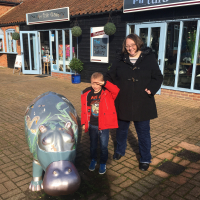I thought fatigue was just tiredness
I thought fatigue was just tiredness and needed sleep, but in actual fact it was much more. Now I understand that, I can do much more about it, that I wouldn't normally want to do. Walk less distance. Pace myself at work. Take more notice of pain. Book a taxi. Notice if my mood is too unhappy. Rest when I'm not so fresh. Get up and do useful things until the mood lifts. Allow as long as it takes. Stop just wishing it would go away. Although come to think of it yes, I wish it would go away lol. 😊
Comments
-
Some great tips there. There truly is nothing like the fatigue that you can get with Arthritis. Difficult to explain to other people though.
Like you I pace myself do less etc, but I also have naps in the daytime or early evening if I need to. I have always set myself alarms for these naps because I want to sleep at night. Someone on here recommended that to me many years ago.
Anyway well done to you for booking that taxi that is so wise.
Take care
Toni x
1 -
Your post has really helped me, I'm new to arthritis and to this group and was worrying because my doctor said she had never heard of fatigue being a symptom of arthritis. She has been great otherwise but this had left me fretting that something else was going wrong. I wish the whole thing would go away too but given that it won't your tips will make it easier to live with so thank you.
1 -
Absolutely agree with the op.
its a different type of tiredness.
important to realise how to manage it and how long it takes to get over when you’ve done too much or had a bad few days of pain.
sometimes even a car journey will knock me out for the whole of the next day.
I don’t try to fight it now i know what it is.
took me ages to figure it out though.
2 -
@Izzy72 It really depresses me how misinformed GPs can be about arthritis. We really ought to refer them to this site! So many people are fobbed off with "it's just arthritis" without any guidance about how to self manage it. At the very least they should direct patients to this site so we can read up on managing our symptoms, appropriate exercises etc, as well as taking our pain seriously.
0 -
@Lilymary I agree so next time I see my GP I'll tell her about it and suggest she might like to mention it to her other patients with arthritis. I accidentally found the link to this site on the NHS Scotland website so she can check it out if she wants to.
1 -
Hiya,
It took me a while to make the link between arthritis pain and fatigue. Soon after my diagnosis I was at my worse. I had stopped exercising, was working 10 hours a day, sat at a desk 5 days a week. I often went to bed after work and also on a Sat and Sun afternoon. I put it down to age, or menopause as I was in my early fifties.
My arthritis pain reduced as I sorted out the best pain relief for me, had physio and started exercising again. I also reduced my working days to 3 and reduced my hours to eight.
I found that I wasn’t as tired and now only occasionally nap on a Saturday or Sunday afternoon. My kids call them Nanna Naps. I think the pain of arthritis really drains us and makes us tired.
However, I still really listen to my body and have a nap when I need it. My husband also seems to know when I need a nap, he must see it in my face, and sends me off to bed. I usually feel better after a snooze.
I was devastated when I was given my diagnosis of osteoarthritis of my spine. My GP offered nothing. This is a life changing condition and no information or treatment was given to me. The huge improvement in my condition only occurred as I complained, researched and joined this site to find a way forward.
Take care
Debbie
3 -
After my hip replacement operation I was advised that a nap for an hour after lunch was a good way of counteracting the fatigue.
The type of tiredness or fatigue I experienced with arthritis was very similar to that I had when I was diagnosed with cancer eight years ago. As others have said above, it's different to "normal" tiredness. This page: https://www.cancerresearchuk.org/about-cancer/coping/physically/fatigue/what-is-cancer-fatigue describes the difference:
>>Cancer related fatigue is different from tiredness which is usually short term and you feel better after you stop, sleep or rest. Cancer fatigue doesn’t usually go away with sleep or rest. It can be severe and last a long time.<<
There are quite a lot of resources for cancer sufferers offering useful tips on how to manage fatigue, some of which I think may help arthritis sufferers, e.g. https://www.nhsinform.scot/illnesses-and-conditions/cancer/side-effects/cancer-related-fatigue Drinking enough water I find makes a difference especially with headaches and brain fog.
1 -
I used to be a sound sleeper but in the last 2 years as PsA took hold that's gone to pot. I now regularly wake 3-4 times a night - usually from about 3 am onwards. I reckon I get about 5 hours of sleep a night. My son bought me a Garmin sports watch when I had a heart issue so I could easily see my heart rate at any time. It does a lot more than that and combined with the smartphone app that comes with it I can monitor my sleep pattern and it is very irregular - particularly from about 3 am onwards. I raised this with a rheumatologist I saw and his theory was that the body naturally produces steroids but does not do so during the hours of sleep and the impact of that is felt in the latter hours of sleep.
I also get really fatigued either the day after or two days after taking methotrexate. I usually go for a lie down in the afternoon when it comes on.
1 -
And so fatigue is back, like some kind of recipe for maturing a Christmas pudding. Attack of hip ache. Two weeks of hip nursing. A week of recovery on painkillers but nearly falling asleep. Feeling better but sleeping like Rip Van Winkle as soon as I lie down.
I must be totally whacked out, and need to take a break, even though oddly enough I don't feel it. I feel nothing.
0 -
I look at fatigue as a brick wall, I can’t go round it, through it or over it, I must stop and like others short breaks through the day help and just stopping whatever I’m doing. The recent heat seems to make things worse. I go from cafe to cafe, seat to shooting stick to low wall to car seat.
pits a grin, honest!
1 -
I get terribly fatigued and would fall asleep on a tightrope if I could walk one. I sit down and fall asleep at all times of day and it can be embarrassing. I don't sleep well at night with disturbance with pain which I don't suppose helps. The drs ran a series of blood tests but apparently nothing abnormal as no feedback.
Once I can get through to the GP I'll ask the question again.
Love n hugs
Trish xx
1 -
Yes. I am growing to think that sleeping isn't a real problem, its the mood that goes with it that tells the story.
If anything, the sleeping is a way I can get the weight off my joints.
I don't feel numb any more although obviously at the time I must have done. It didn't take much to feel better, just the hip pain is gone, and a change of plan to get more tidying done in the week, instead of letting it drag on, and decide what I want to do next. I think I read once that a good way to feel better is to learn something new.
0 -
Sleep is great and in general it’s good for us, a resting and curative time. It also has a downside, lying down without a pillow makes my head spin (pressure on a nerve) adding a pillow gives me a pain down my leg into my foot(same but lower, turning on either side makes my shoulder joints painful, lying on my stomach the same. Better to make myself so tired and then sleep but keep moving. Heat helps, hot bath and wheat bags, and painkillers etc etc.
pits a grin, honest!
0 -
That's interesting @Airwave! I sleep on my back with a foot wedge that seems to help sleep that way up, but generally I go to sleep and wake up with pain in my shoulders. Hefting myself out of bed on my arms is painful so I roll out as well. I kind of live with it and haven't questioned much lately what would happen if I tried to sleep on my side. The affect of painkillers was interesting, it kind of dulls the joint ache so I can focus on using the muscles instead. Worth knowing. I even gain a sudden strength from painkillers but of course its not real strength, its just a difference in the affect of pain.
1 -
I used to think fatigue was just about being tired and needing sleep, but now I know it's much more than that. Understanding this has allowed me to take better care of myself. I've learned to walk shorter distances, pace myself at work, and pay attention to pain. When needed, I don't hesitate to book a taxi. I also notice how my mood can affect fatigue, so I try to address it and rest when needed. On better days, I engage in useful activities until my mood lifts. I've learned to be patient and stop wishing it away, although, honestly, sometimes I still do wish it would magically disappear! Overall, it's a journey, and I'm committed to managing my fatigue and improving my well-being.
2 -
Thanks @Airwave! for your comment:
“I look at fatigue as a brick wall, I can’t go round it, through it or over it, I must stop and like others short breaks through the day help and just stopping whatever I’m doing. The recent heat seems to make things worse. I go from cafe to cafe, seat to shooting stick to low wall to car seat.”
That’s exactly how I feel as well. I’m a full-time carer for my 91 year old Dad and there are days when I just can’t do anything but rest, rest and more rest!
0 -
Hi @Sunflower25 and welcome to the Community. We are a friendly and supportive group and I hope that will be your experience as well. It is a safe place to comment, ask questions or even just for a rant from time to time😀
Have a read of the links and comments above and if you have any other questions please do not hesitate in asking. We are all here to support each other. Now you are here please keep posting and let us know how you are getting on.
With best wishes,
Peter (moderator)
Need more help? - call our Helpline on0800 5200 520Monday to Friday 9am to 6pm
1 -
That feeling when you want to keep going but are so physically and mentally exhausted you just have to sleep. Know it well! Pacing is key, plus gentle exercise when you can. I find aquafit (aquaerobics) and swimming are great exercise as they are low-impact and you can move as slowly or quickly as your joints allow. Even if you just stay in for 20 mins it's better than nothing. I often need a nap afterwards but I feel like I've earned it somehow. Feeling much better after 2 months of gentle exercise. Don't give up, don't despair, keep plodding on an you'll get there!
1 -
I stopped taking painkillers in July last year. The pain went away, nobody has explained why, it just seemed to be from taking care not to aggravate the aches and pains.
I still wish the fatigue would go away. I get home after work and I am done for.
0
Categories
- All Categories
- 4 New Community
- 4.1K Our Community
- 3.3K Living with arthritis
- 240 Chat to our Helpline Team
- 12 Surgery - Pre and Post
- 33 Coffee Lounge
- 3 Exercise Resources - view only
- 38 Food and Diet
- 77 Work and financial support
- 6 Want to Get Involved?
- 204 Hints and Tips
- 55 Young people's community
- 13 Parents of Child with Arthritis
- 21 My Triumphs
- 26 Let's Move
- 27 Sports and Hobbies
- 18 Coronavirus (COVID-19)
- 23 How to use your online community
- 17 Community Feedback and ideas






